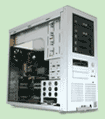
I’ve recently come to the realization that we’re living in an age of disposable computers. Machines are bought, become obsolete or fail, and then are thrown away to be replaced — and the cycle begins again.
In the grand scheme of consumer products, we’ve come to accept computing hardware as a transitory thing. For most users, it has become accepted that a new machine is a short-term investment. Generally, a home computer is replaced every three to four years.
According to Greenhome.com, more than 10 million computers are dumped in landfills each year. While the government restricts high volume dumping, and forces giant, computer devouring enterprises to recycle, the average small business and home user get along just fine ditching their old hardware at the local transfer station.
Computer engineer Mark Beckley is single-handedly breaking that cycle by building desktop machines that defy all the common causes of hardware failure. At the same time, he’s throwing out the notion that computers should be disposable.
Beckley, the 51-year old founder of Small Biz Computing, saw plenty of disposable computers during his days as a general computer repair man. He spent a lot of time on hard drives, and knows that data is often lost due to faulty hardware. Conversely, perfectly good hardware is often tossed because of corrupted data. After a while, Mark told himself, “I need a bombproof machine.”
Then, he set to work building it. What resulted was the Green Machine.
Mark’s Green Machine is named for its ability to stay out of U.S. landfills, but is so much more than an environmental effort — the Green Machine embodies a passion to build the best that can be built.
Mark constructs them all himself in his Reading, Mass., home, and is proud to say “I only use best in class parts from best in class manufacturers.” To guarantee it lasts, The Green Machine is designed from the ground up to withstand all of the hazards that cause a computer to fail in the first place.
According to Mark, computers fail for three basic reasons:
- The first is static electricity, which the Green Machine deflects with its metal casing and solid grounding.
- Overheating is another main cause, which is usually due to cooling fan problems. The Green Machine has a viewing window on the side of the tower so that you can always see if the fan is performing, and put it in line if it isn’t.
- Computers also crash due to power inconsistencies and spikes or, as Mark calls it, “dirty power.” Because The Green Machine runs at 30% – 40% capacity, it has plenty of room to handle a sudden surge of energy, so that hazard is thwarted as well.
In addition, Mark’s machines have multiple removable hard drives for data backup and hard drive replacement, as well as easily removable components for upgrades. That way, the CPU continues to last as long as the housing it resides in.
These problems seem to be a straightforward fix (at least for a computer engineer), so why aren’t similar techniques adopted by larger companies? Makes me wonder about theories of planned obsolescence in our tech products.
Mark grew visibly irritated when he explained that computer manufacturing giants are driven by price points rather than reliability, which, he points out, makes cruel business sense. For many hardware manufacturers, it’s ok to sacrifice quality so they can sell a desktop at $400. They don’t care if the thing breaks, in fact, that usually means another sale.
Mark’s motivations are the opposite. Since he’s only one man serving to small businesses, it’s in his best interest to lower repair needs by building high quality machines. However, judging from my phone conversation with him, such benefits are mostly coincidental. He’s a genuine innovator who does what he does because “it’s a blast building these machines,” and he’s “passionate about it.”
Whether or not it’s by design, our computers break on a regular basis, empty our wallets, and stuff our landfills. There’s a beautiful simplicity to Mark’s idea of building a computer that doesn’t break, and it’s one that should be better appreciated by consumers. Granted, Mark’s computers will cost more that the big manufacturers’ disposables, but he’s trying to “get people to think long term and think about the planet.”
I hope he does, too. Right now Mark says he’s “playing David to Goliath” and will probably continue to focus his production on the small business crowd for the time being.
I must say, I’d like to see more products like his. Kudos to Mark for innovating for the people and creating a machine that lasts because it can.
To learn more about Mark Beckley’s Green Machine, be sure to check out his site: http://www.greenmachinecompany.com.
